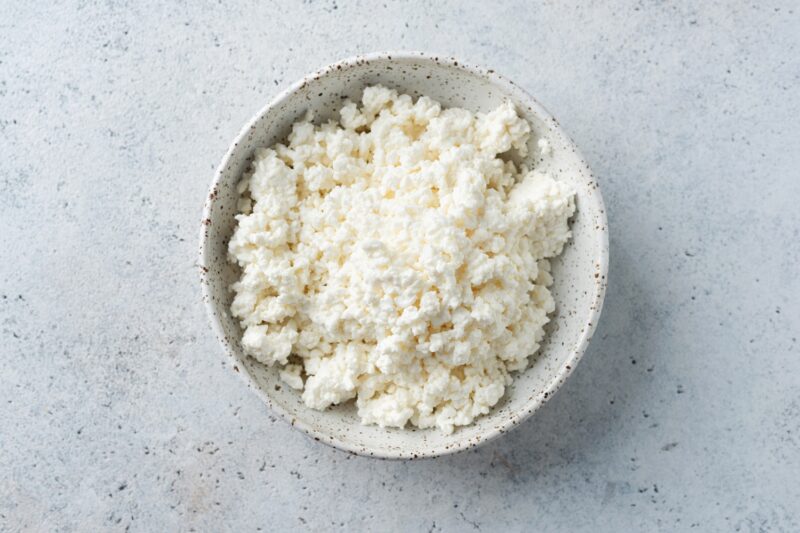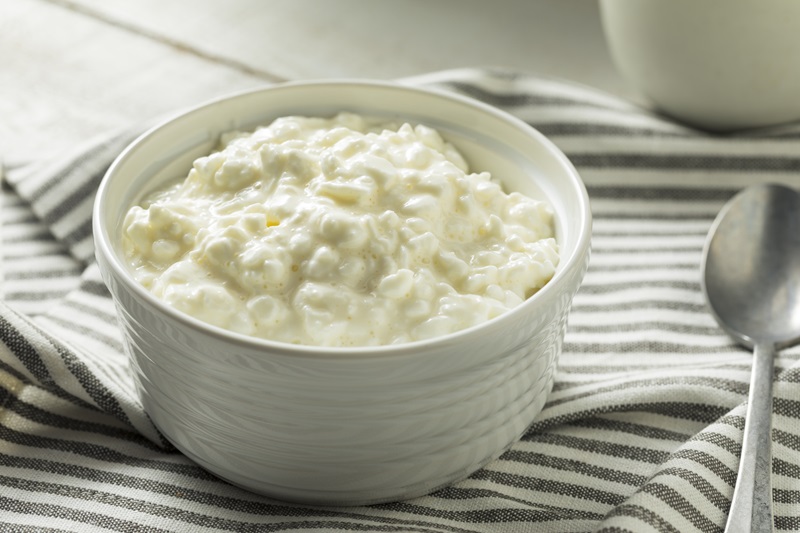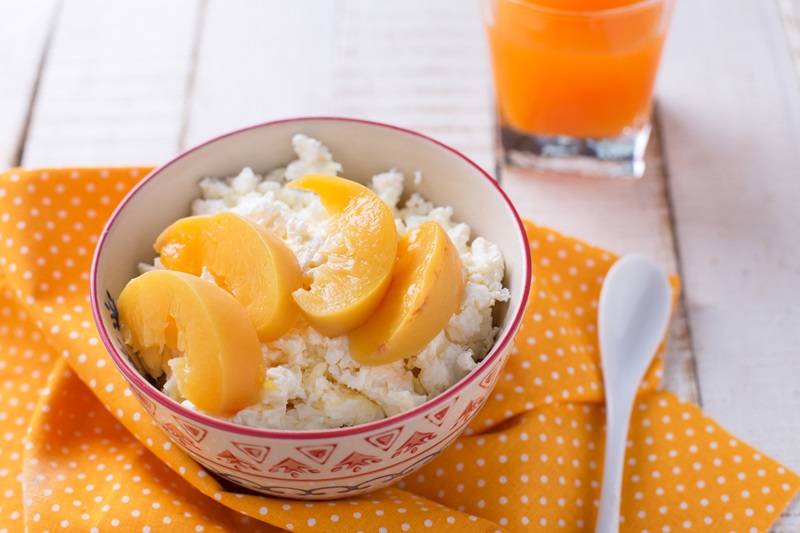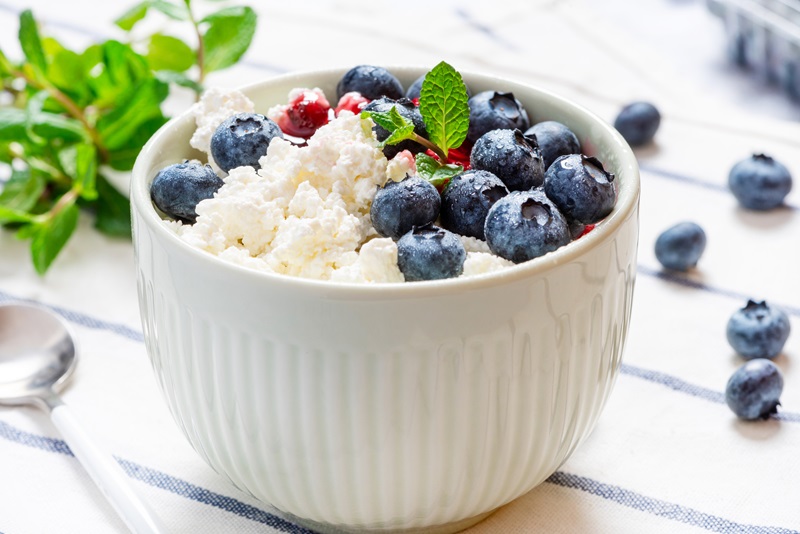Superfood Spotlight: The Health Benefits of Cottage Cheese
Article posted in: Diet & Nutrition
Dive into the surprisingly impressive world of cottage cheese—a humble dairy product that packs a nutritional punch. Often overshadowed by more glamorous superfoods, cottage cheese is a powerhouse of health benefits that deserves a spotlight of its own.
From being rich in protein to offering essential nutrients that support bone health, weight management and muscle recovery, this versatile food is more than just a diet staple. Join us as we explore how adding cottage cheese to your diet can boost your health and well-being, making it a true superfood hero. Keep reading as we break down the health benefits of cottage cheese, including its nutritional profile. Plus, learn some delicious ways to incorporate it into your meals.
How is Cottage Cheese Made?

Cottage cheese is a fresh cheese known for its distinctive, lumpy texture and mild, slightly tangy flavor. It’s made by curdling pasteurized cow’s milk using an acid or a bacterial culture, which causes the milk to separate into curds and whey. The curds are then cut and cooked until they reach the desired firmness.
After cooking, most of the whey—the liquid remaining after milk has been curdled and strained—is drained away, leaving behind the soft, creamy curds that are characteristic of cottage cheese. This cheese can be made with varying levels of milk fat, from non-fat to full-fat versions, and may include additives like cream for a richer taste or salt for enhanced flavor.
You can eat cottage cheese alone or use it an ingredient in a wide range of dishes. Its simplicity and nutritional profile make cottage cheese a popular choice among health-conscious consumers and those looking to add a protein-rich, low-fat option to their diets.
Nutritional Profile of Cottage Cheese

A half-cup serving of low-sodium cottage cheese with 1 percent fat contains approximately 81 calories, as noted by the United States Department of Agriculture (USDA) nutrient database. This modest serving size packs a powerful nutritional punch, offering 14 grams of protein, which is essential for muscle repair and growth. Additionally, it contains only 2.3 grams of fat, making it an excellent choice for those monitoring their fat intake.
Cottage cheese is also rich in calcium and potassium, nutrients crucial for bone health and cardiovascular function. Remarkably, this serving of cottage cheese provides more protein than an equivalent serving of Greek yogurt, making it a superior choice for those looking to maximize their protein consumption without adding significant calories. This makes low-sodium cottage cheese a versatile and nutritious option that can support a range of health goals, from weight management to muscle recovery.
Comparing Cottage Cheese with Other Dairy Products

Cottage cheese stands out among dairy products due to its unique texture and versatility. Unlike smooth, creamy yogurts and ricotta, cottage cheese features distinct, soft curds that provide a satisfying chewiness not typically found in other dairy items.
In terms of nutrition, it is lower in fat and calories than cream cheese but higher in protein, making it an excellent choice for those seeking to increase their protein intake without consuming excessive calories.
Compared to Greek yogurt, cottage cheese typically offers a comparable amount of protein but with a different nutrient profile, including higher levels of calcium and phosphorus. This makes it particularly beneficial for bone health.
Furthermore, while yogurt is often praised for containing probiotics, cottage cheese can also contain live cultures if specified, enhancing its digestive health benefits. Overall, its mild flavor and substantial texture allow for easy incorporation into both sweet and savory dishes, providing a nutritious alternative that can be adapted to various dietary needs and preferences.
Core Health Benefits of Cottage Cheese

Muscle Recovery and Growth
Dairy foods like cottage cheese contain two different kinds of protein, casein and whey. Casein is more slowly absorbed by your body than other proteins, so it keeps you feeling full and energized for a long time after eating.
This protein also plays an especially critical role in building and repairing muscle, which is why cottage cheese is so popular as a post-workout food. In addition, eating casein reduced the cholesterol levels of overweight men, according to a report in the Journal of Nutrition.
Bone Health and Calcium
The USDA recommends that men and women ages 20 to 70 get 1,000 milligrams of calcium daily. Like all dairy foods, cottage cheese is a rich food source of calcium. The mineral is the primary component of our bones and teeth, and it is essential to the work of the circulatory system and to proper muscle function.
Calcium also ensures your metabolism stays active and it seems to have an anti-obesity effect, says a study published in the International Journal of Molecular Sciences. The researchers theorize that calcium works by regulating “fat absorption and excretion,” among other impacts.
Managing Hunger and Digestion
If you eat eggs for breakfast to satisfy your hunger after a long night’s sleep, cottage cheese can be just as effective. A team of researchers compared the responses of a group of people who ate eggs versus a group that ate cottage cheese and shared their results in the journal Appetite. The scientists noted the elapsed time between eating the eggs or cottage cheese and the subject’s lunch request, their food intake at lunch, and their satiety scores. The results showed that eating cottage cheese keeps hunger at bay as well as eggs.
The microbes in our digestive tract help our bodies to process food and extract the nutrients. They also are directly linked to our immune systems. Live cultures in foods such as yogurt are pro-biotic, meaning that they help nourish the “biome,” or community of microbes in our guts. To get these health benefits from cottage cheese, look for brands that contain live or active cultures.
Cardiovascular and Diabetes Prevention
Regular consumption of cheese and other fermented dairy foods are linked to a lower risk or cardiovascular diseases and Type 2 diabetes, according to a report in Advances in Nutrition. “Dairy consumption including cheese is linked to lower cardiovascular disease risk,” the researchers note.
A study in the journal Nutrients highlighted that consumption of low-fat dairy products lead to “a decrease in the risk of insulin resistance and type 2 diabetes.”
How Cottage Cheese Supports Weight Loss

Cottage cheese might be the hottest trend in weight loss these days. But unlike many fads, much of the hype about cottage cheese is supported by independent scientific research.
Studies show that it fills you up and fuels you up, helps your body build muscle, protects your bones, reduces your risk of diabetes and cardiovascular disease, and can play a valuable role in helping you to lose extra pounds.
An article in Nutrients reported a significantly lower waist circumference as well as body weight in individuals “who regularly consume low-fat dairy products.” Likewise, “dairy consumption increases lean body mass and reduces body fat,” says the research report in Advances in Nutrition.
Versatile Ways to Incorporate Cottage Cheese in Your Diet

Simple Cottage Cheese Combinations
Cottage cheese is a simple food that you can enjoy all by itself or mixed with fresh fruit such as berries, peaches, bananas or melon chunks. Or go with a savory taste and add tomatoes, cucumbers or sweet bell peppers to a bowl of cottage cheese.
For plenty of flavor and fun, try our Peanut Butter and Jelly Cottage Cheese Bowl recipe. It’s packed with protein and the great taste of peanut butter and blueberries.
Baking with Cottage Cheese
You can also use cottage cheese as an ingredient to increase the protein and calcium content of other dishes. Mix it into pancake and waffle batter as a substitute for milk. It works well in cakes and muffins, too.
Substitutions for Healthier Cooking
Give scrambled eggs more protein and a firm texture by blending them with cottage cheese before cooking. Start the day with a satisfying meal by whipping up our Turkey Bacon and Cheese Egg Bites. You can make them in advance and the family can grab them as they head out the door.
For an extra thick and satisfying smoothie, use some cottage cheese in place of the milk. Stir a little honey into cottage cheese and use it as a creamy spread for toast. Whipped cottage cheese works as a substitute for sour cream or Greek yogurt in dips. The creamy curds make a low-fat replacement for ricotta cheese in dishes such as lasagna and baked ziti.
Cottage cheese may be getting the most attention these days as an ingredient in simple homemade ice cream. All you need to make it is a blender and your choice of flavorings and it comes out thick, rich, and creamy. We’ve collected a few of our cottage cheese ice cream recipes for you to try. We love them all but if you’re a fan of the sweet and spicy taste of cinnamon, you need to make a batch of the Churro Cottage Cheese Ice Cream. The whole family will clamor for more Cookies and Cream Cottage Cheese Ice Cream. And that’s the kind of healthy eating trend everyone can believe in!
Shopping Tips for Cottage Cheese

When shopping for cottage cheese, bear in mind that a half-cup of cottage cheese counts as one PowerFuel serving when you’re losing weight with Nutrisystem. Check labels on containers sold as “single servings” to be sure you’re not eating too much at a time.
Look for varieties that are low-fat or fat-free and that are low in sodium. Keep in mind that some recipes may need a higher fat content, such as the trendy cottage cheese ice cream.
Be sure to steer clear of flavored cottage cheese, as they tend to come with a lot of added sugar. It’s better to add your own flavorings so you don’t load up on excess calories.
Looking for more delicious ways to enjoy cottage cheese? Try out these irresistible cottage cheese ideas to boost your protein intake (even if you’re not a fan of cottage cheese)!






